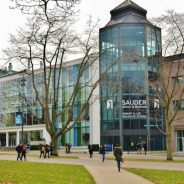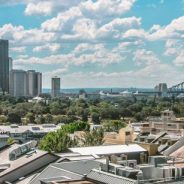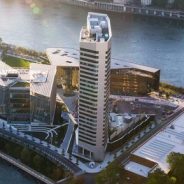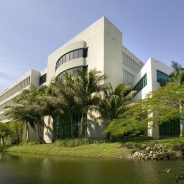Search results for career:
International MBA
UBC Sauder School of Business International MBA Structure
The UBC Sauder School of Business’ Robert H. Lee Graduate School International MBA is a 20-month part-time program taught at the Antai College of Economics and Management at Shanghai Jiao Tong University. The program is designed for Chinese business professionals seeking an global academic experience, complete with a trip to Vancouver.
Students start the program in November, with eight foundational courses, taught in Shanghai. In April/May of the first academic year, students complete the mandatory Vancouver, Canada residency, before returning to Shanghai to complete their Capstone project. Students also have the option to return to Vancouver to attend a graduation ceremony.
Classes are taught mostly on weekends. Friday classes last from 3:30 – 10 p.m., with Saturday and Sunday classes running from 9 a.m. to 5 p.m. Individual classes are taught over one weekend, with exams taking place on the first day of the successive class.
Curriculum
The IMBA foundation courses, taught at Jiao Tong University, include the following:
• Business Strategy
• Corporate Finance
• Foundations in Accounting
• Foundations of Managerial Economics
• Marketing
• Operations & Logistics
• Organizational Behaviour
• Statistics
• Integrated Project
These courses are completed from the first month of the program, beginning in November, until July. At the end of April, students complete the two-week residency at the Vancouver UBC campus. The final 12 months of the program are comprised mostly of advanced courses, of which include:
• Accounting
• Financial Reporting
• Financial Statement Analysis
• Entrepreneurship
• Finance
• Investments
• Human Resource
• Managing Change
• Two Party Negotiations
• Brand Management
• Services Management
• Supply Chain Management
• Process Fundamentals
• Strategy
• Corporate Strategy
• MIS
• Managing Information Technology
Like the full-time and Professional MBA options at UBC Sauder, students in the IMBA program complete Career and Professional Development programming through entirety of their schedule, of which includes workshops, networking events, and more. An additional Global Network for Advanced Management module may be available for select students, allowing them to travel abroad even more for their global education.
Class Profile
The average age of the UBC Sauder International MBA class is 34-years old. About 42 percent of the most recent class is male, with 58 percent female students. In total, the class featured 45 students. The average amount of previous work experience is 11 years. More than 90 percent of the class originate from China.
Tuition, Scholarships, and Financial Aid
The total cost of the UBC Sauder International MBA program is $60,000 USD, payable in two separate installments. An additional $2,500 fee is required to hold a spot in the program. Additional costs are as follows:
| Expenses | Cost (USD) |
|---|---|
| Optional Prep Program Fee | $150 for each individual course, or, $400 for all three |
| Optional Global Network for Advanced Management (GNAM) | $5,600 |
| Vancouver Flight | $1,000 |
| Accommodation in Vancouver | $2,100 |
| Medical Insurance | $100 |
| Transportation | $80 |
| Food and Other Expenses | $700 |
The total estimated cost, with all other fees, insurance, travel, and miscellaneous factors included, is about $69,980.
Outstanding students may be rewarded a UBC International MBA Entrance Scholarship, which can range anywhere from $1,000 to $6,000. The range of the scholarship is dependent upon the time of application, with earlier applicants given higher scholarship opportunities.
Private and federal loan funding may be available, per student.
Admissions
In order to apply to the UBC Sauder International MBA program at the Robert H. Lee Graduate School and the Antai College of Economics and Management at Shanghai Jiao Tong University, applicants must have earned a three-or-four year undergraduate Bachelor’s degree from an accredited institution while maintaining a GPA of at least a ‘B+’ (76 percent or 3.3). There is no minimum GMAT/GRE score requirement, but the suggesting GMAT minimum is 550 and in the 50th percentile for each test section. GRE scores should be at least 155 for the verbal and quantitative sections. At least two years of full work experience is also required. However, it is suggested that applicants have at least five years of prior experience.
Applicants must also be able to speak fluent English in order to enroll. For those who did not earn an undergraduate degree in Canada, the U.S., or UK, or didn’t earn a degree from a predominantly English-speaking academic institution, TOEFL/IELTS/CAEL scores are required. Applicants must score a minimum of 80 on the TOEFL exam, 6.5 on the IELTS, or 70 overall on the CAEL.
The following must also be submitted:
• A completed online application
• Official transcripts
• $143 CAD application fee
Application deadlines are as follows:
Round Two – June 11, 2019 (final deadline for scholarship consideration)
Final Round – August 27, 2019
Professional MBA
UBC Sauder School of Business Professional MBA Structure
The Professional MBA program at the UBC Sauder School of Business’ Robert H. Lee Graduate School is a 24-month part-time program with classes taking place once every two-to-three weeks, complete with winter and summer breaks and three, eight-day Professional Residencies held each January in the program, and the final month of the program.
Assisting with student’s full-time employment schedules, exams are held completely online.
Curriculum
The program begins in January with the first of three residencies. Following the introduction to the program, Professional MBA students complete foundational courses in the first year. The second year is dedicated to Advanced Courses and optional Global Network of Advanced Management Small Network online courses. Through the entirety of the program, students complete hands-on Career and Professional Development programming, of which includes workshops, networking events, and more.
Class Profile
The most recent UBC Sauder class features 47 students, of which 60 percent were male students and 40 percent were female students. The average work experience of the class was seven years and the average age was 31-years old.
Career Statistics
Upwards of 90 percent of Professional MBA students advanced their careers after earning the degree.
Tuition, Scholarships, and Financial Aid
The total cost of tuition for the UBC Sauder Professional MBA program at the Robert H. Lee Graduate School is $48,450 CAD for Canadian residents and $80,060 CAD for international residents. A non-refundable $2,500 CAD deposit is required to hold a spot in the program upon admission.
Total tuition and fees are as follows. Note, these figures do not include cost of living in Vancouver:
| Expenses | Cost (CAD) |
|---|---|
| Tuition | $48,450 (Canada Resident) $80,060 (International Resident) |
| Student Fees | $2,600 |
| MBA Student Building Fee | $1,600 |
| MBA Society Fee | $400 |
| Supplies | $3,000 |
Early entrance scholarships of $1,000 CAD and $2,000 CAD are offered to applicants that apply before select MBA deadlines (see: below). Federal and private loans may be available to select applicants to help fund their educational needs. However, international students, unless the payment is provided via their employer, likely can only sign for private loan funding.
Admissions
In order to apply to the UBC Sauder Professional MBA program at the Robert H. Lee Graduate School, applicants must have earned a three-or-four year undergraduate Bachelor’s degree from an accredited institution while maintaining a GPA of at least a ‘B+’ (76 percent or 3.3). GMAT scores must be, at a minimum of 550 and in the 50th percentile for each test section. GRE scores should be at least 155 for the verbal and quantitative sections. However, the school suggests applicants score around 650 on the GMAT and 320 on the GRE. A minimum of three years of prior work experience is also required, although the current average is seven years per student.
The following must also be submitted:
• A completed application
• Official transcripts
• A current resume
• $143 CAD application fee
• Letters of reference
• GMAT/GRE scores
• Proof of English proficiency (if necessary)
• Essays
Strong candidates will be asked to conduct an in-person interview on the UBC Sauder campus.
Application deadlines are as follows:
Round One – May 31, 2019 ($2,000 CAD scholarship deadline)
Round Two – July 18, 2019 ($1,000 CAD scholarship deadline)
Final Round – Oct. 9, 2019
Top MBA Recruiters: American Express
The fact that “Don’t leave home without it,” once American Express’ omnipresent tagline, is now “Don’t live life without it” speaks to its transformation. Its YouTube channel features content ranging from “Unlock the Money,” showing the evolution of various startups, to “Epic Everyday,” which offers crafty lifehacks like how to make smoothie ice cubes. Not just a credit company anymore, AMEX has billed itself an “engine of commerce.”
Like many global financial services groups in 2019, AMEX has learned that to thrive, it must adapt to meet the many needs of the millennial consumer. This, along with its wide variety of job opportunities and a top global recruitment program, make it a great place to work for MBAs.
Why American Express?
With over 65,000 employees worldwide, American Express was ranked 13th by Fortune on its “100 Best Companies to Work For” list in 2019. One of its major attractions is the recent added focus on work life balance, and it now offers a whopping five months of family leave time for new parents. Other benefits include generous healthcare coverage which begins on day 1 of employment, wellness and prevention programs, and tuition assistance. American Express also offers a variety of virtual positions, along with a compressed work week.
The company also matches employee donations to nonprofits, offers a variety of volunteer opportunities, and prioritizes environmental sustainability efforts across all levels of employment. It has also earned 100 percent on the Human Rights Campaign’s Corporate Equality Index for LGBTQ—inclusive workplace policies and practices. In addition, AMEX was voted the “Best Company for Diversity” by Black Enterprise in 2017 and one of the “Top Companies for Women in Tech” in the same year.
Phoenix, Salt Lake City, and Fort Lauderdale are listed as key cities for external hiring and internships, and the New York City headquarters is a top hiring location as well.
American Express Salaries
Glassdoor reports the typical American Express Analyst salary at $72,034. Managers make $101,000, while Senior Marketing Managers make $118,000. Top salaries are $149,000 for Marketing Directors and $196,000 for Vice Presidents.

Starting an American Express Career
American Express’ recruitment program is robust, and it hires MBA interns across all disciplines. According to one recruiter, “The culture and people at AMEX are what make it a great place to intern … [it’s] an environment centered around collaboration.” Interns can find opportunities in the following areas:
- Consulting
- Finance
- Marketing
- Operations
- Human Resources
- Risk and Governance
One former intern says, “Many of the casual coffee chats of my intern days have developed into true mentor-mentee relationships in my full-time career.” The 12 week summer internship program is offered in New York, Phoenix, or Fort Lauderdale, and AMEX also offers ‘talent communities’ in which students and professionals can track available opportunities and find matches for their abilities. Having shifted in the past decade to a focus on digital commerce, AMEX seeks MBA graduates who are well versed in data analysis, no matter what position they seek.
Top recruiting schools for AMEX include the New York University Stern School of Business, Columbia Business School, the University of Michigan Stephen M. Ross School of Business, Cornell’s SC Johnson School of Management, London Business School, IESE Business school in Barcelona, IIT Bombay, and IIM Ahmedabad. Roughly 250 interns and full-time hires are brought into the company each year, according to recent figures.
A final helpful piece of American Express career advice offered by a recruiter:
“It’s your job to sell us on your passion. I also need to understand that you know what the job is. That might seem obvious, but a lot of people come in unprepared. I love questions from candidates that look to the future: ‘What do my first 90 days look like?’ ‘What are the key things you’d like to help me to achieve?'”
Full-Time MBA
UBC Sauder School of Business Full-Time MBA Structure
The full-time MBA program at the UBC Sauder School of Business is a 16-month AACSB-accredited program taught at the university’s Robert H. Lee Graduate School. Beginning in August, the program is built around five separate critical themes: creativity; decision making; global issues and marco-economics; ethics and sustainability; and leadership development.
The first two periods (or, terms) of the full-time MBA at UBC feature core coursework, with elective courses built around the student’s selected career tracks integrated from the third to the seventh periods of the program. At the tail end of the third period (late February and early March), students attend a mandatory two-week trip abroad, adding a significant global business experience element to the program. Expertiential learning practices, including a student internship, are introduced in the fourth period, lasting until the seventh period, where students conclude the program with a Capstone project.
Curriculum
The foundation courses of the UBC Sauder full-time MBA include the following topics: Accounting; Intro to Finance; Organizational Behavior; Marketing Fundamentals; Operations Fundamentals; and Managerial/Micro Economics. Specified career tracks, which integrate a student’s electives, include: Finance; Product and Service Management; and Innovation and Entrepreneurship. A custom career focus is also available for entrants, combining some of the aforementioned specializations.
Class Profile
The most recent UBC Sauder full-time MBA class features 97 students, 66 percent of which were male and 34 percent of which were female. About 51 percent were of international distinction. The age range of the class was 24-41-years old and the average work experience upon entry was five years.
Career Statistics
An estimated 85 percent of the most recent UBC Sauder full-time MBA class was employed within three months of earning their degree, with an average annual salary of $85,289 CAD.
Tuition, Scholarships, and Financial Aid
The total cost of tuition for the UBC Sauder full-time MBA program at the Robert H. Lee Graduate School is $48,450 CAD for Canadian residents and $80,060 CAD for international residents. Combined with the cost of living in Vancouver, and the Global Immersion fee, and an additional CAD course fee, the total cost of the program for Canadian residents will cost more than an estimated $105,000 CAD. Cost of living and other fees are the same, regardless of student residency. However, with the increased tuition rate, international students living full-time in the city should expect to pay more than $137,000 CAD for the entire program.
An estimated 25-40 percent of the class are automatically awarded merit-based scholarships upon entry. However, external scholarships may also be available.
Federal and private loans may be available to select applicants to help fund their educational needs. However, international students, unless the payment is provided via their employer, likely can only sign for private loan funding.
Admissions
In order to apply to the UBC Sauder full-time MBA program at the Robert H. Lee Graduate School, applicants must have earned a three-or-four year undergraduate Bachelor’s degree from an accredited institution while maintaining a GPA of at least a ‘B+’ (76 percent or 3.3). GMAT scores must be, at a minimum of 550 and in the 50th percentile for each test section. GRE scores should be at least 155 for the verbal and quantitative sections. However, the school suggests applicants score around 650 on the GMAT and 320 on the GRE. A minimum of two years of prior work experience is also required, although most students are expected to have at least three years of prior experience, with the average currently at five years per student.
The following must also be submitted:
• A completed application
• Official transcripts
• A current resume
• $143 CAD application fee
• Letters of reference
• GMAT/GRE scores
• Proof of English proficiency (if necessary)
• Essays
Strong candidates will be asked to conduct an in-person interview on the UBC Sauder campus or via Skype.
Next Application Deadline
Domestic: Jan 6th, 2022
International: Jan 6th, 2022
The Best New Investment MBA Jobs
Investment firms typically act as intermediaries between investors and corporations. They are also popular landing spots for MBAs to bring their talents after earning their degree. There are exciting new positions out there for both new grads and seasoned workers alike. Here’s a look at some of the best new MBA jobs in the investment banking sector: Continue reading…
Sauder School of Business – University of British Columbia
History
In 2003, nearly 50 years after the original founding of the UBC Faculty of Commerce and Business Administration, the school was renamed in honor of Dr. William Sauder, who awarded the school $20 million. Just a few years later, Vancouver business philanthropist Robert H. Lee donated another large gift to the school, helping establish the Robert H. Lee Graduate School.
Location(s)
The UBC Sauder Business School is located in the central part of the Point Grey campus in Vancouver, British Columbia, Canada. The school has an additional facility, the UBC Robson Square, in downtown Vancouver. The main campus is located about 20 kilometers northeast of the Vancouver International Airport.
Facilities
The MBA programs at the Sauder School of Business are taught by the Robert H. Lee Graduate School, which was renovated in 2012, alongside the entire business school. The Robert H. Lee Graduate School building features class and meeting rooms, conference rooms, video centers, and more. The recently renovated complex also features the Bruce R. Birmingham Undergraduate Centre, the Hari B. Varshney Business Career Centre, the Jim Pattison Leadership Centre, lecture halls, theatres, common areas, and much more. The 2012 renovation added 55,000 square-feet to the original 216,000 square foot building.
Faculty
The business school features 82 full-time tenured or tenure-tracked professors and 25 full-time lecturers.
Student Body
UBC Sauder features 3,751 undergraduate students, 81 Master’s of Management students, 198 full-time MBA students, 89 part-time MBA students, 63 International MBA students in Shanghai, and 59 MSc/Ph.D. students.
MBA Degree Offerings
UBC Sauder offers graduate students a full-time, part-time, and International MBA program, in addition to a dual JD/MBA program.
Flex Advantage: Finding Which MBA is Right for you at UC San Diego
Sponsored Content
On the surface, a part-time MBA decision has obvious benefits. In contrast with full-time MBA degrees, scheduling is often much more flexible, allowing students to complete the program on their own time while continuing their careers outside of the classroom. However, there are more factors that go into the decision-making process before enrolling in business school. How experienced are the faculty? What kinds of experiences can you earn at one school that you cannot at another?
The multiple part-time MBA options at the University of California San Diego Rady School of Management offer consummate answers to these enduring questions. Its FlexWeekend and FlexEvening programs do not fit the traditional part-time MBA billing. Rather, it incorporates elements of the full-time, part-time, and Executive MBA offerings you may find split at many other top-ranked schools, giving students a definitively unique learning opportunity.
Best Real Estate MBAs in the Northeast
While a career in real estate is not one of the most popular options for MBA graduates, it is a solid choice. The U.S. real estate industry pulls in over $166 billion in revenue each year, and markets in India, China, and other emerging economies are poised to expand. So, the question is, if you’re looking to go to school in the Northeast, where are the best MBA programs to help build a career in the industry? We’ve highlighted five of our favorite Northeast real estate programs below.
The Best Northeast Real Estate MBA Programs

The NYU Stern School of Business offers full-time MBA students a chance to specialize in real estate. According to the school, it “provides rigorous training in the development, investment, and financing of real estate projects.” Students who choose the specializing are taught to think strategically about real estate in primary and secondary markets including the legal, taxation, and regulatory environments they’ll encounter.
Real estate MBA curriculum includes classes such as:
- Real Estate Development and Entrepreneurship
- Real Estate Transactions
- Real Estate Investment Strategies
- Urban Systems
Real Estate Outside the Classroom:
- Center of Real Estate Finance: Established in 2012, the Center is dedicated to expanding the School’s course offerings and career services in real estate. It’s open to both MBAs and undergraduates alike and offers monthly events, research and more.
- MBA Real Estate Club: The Stern Real Estate Club (SREC) offers guest lectures, panel discussions, mixers, site visits, and case competitions for MBA students interested in expanding their real estate experience and insight.

The Georgetown University McDonough School of Business also offers a specialization in real estate for MBA students, which can include an intensive learning experience (ILE) in real estate development. ILEs are elective courses that offer client-centered work and experiential learning opportunity off campus in a concentrated time format.
MBA students interested in real estate can take courses in:
- Real Estate Private/Public Equity
- Real Estate Private/Public Debt
- Negotiations
- Fixed Income Analysis
Real Estate Outside the Classroom
- Steer Center for Global Real Estate: The Steers Center “offers students unparalleled access to the real estate industry at a global level.” Students gain hands-on experience with the D.C. real estate market through a range of activities from alumni mentoring to internships, job contacts, and more.
- Real Estate Industry Career Coach: Georgetown offers a career coach with specific industry knowledge and relationships in real estate. This career coach will help MBA students with their resume, cover letter, mock interviews, and networking strategy.

At The Wharton School, MBA students can major in real estate. This major includes two required courses in real estate investment and real estate development. The goal of the major is to “prepare students to be leaders in the real estate industry” and provide the necessary quantitative and qualitative tools to be successful. Offered since 1985, the major has grown in scope and size over the years.
Additional courses in real estate that Wharton MBA students can enjoy:
- Global Real Estate: Risk, Politics, and Culture
- Urban Real Estate Economics
- Real Estate Law
- Real Estate Entrepreneurship
Real Estate Outside the Classroom
- Samuel Zell & Robert Lurie Real Estate Center: Each year, the Real Estate Center sponsors conferences, seminars, and special programs for students and faculty interested in real estate. Established in 1983, it promotes excellence in real estate education and research.
- Wharton Real Estate Club: The Wharton Real Estate Club provides career development, mentorship, and networking opportunities for students at Wharton. Of particular note are the treks and tours that allow students to meet prospective employers, visit project sites, and gain first-hand experience.

The Columbia Business School’s MBA Real Estate program “provides students an unparalleled opportunity to expand their entrepreneurial skills while focusing on real estate finance and investment management.”
The program encourages students to view real estate as both a physical and financial product by emphasizing a blend of theory and practice. Throughout the curriculum, students work on 65-plus proprietary real estate business cases taught by real estate professionals.
The real estate curriculum differs every term, but it includes courses such as:
- Real Estate Finance
- Real Estate Transactions
- Real Estate Portfolio Management
- Social Impact Real Estate Investing and Development
Real Estate Outside the Classroom
- Paul Milstein Center for Real Estate: The Center for Real Estate integrates the theoretical and practical knowledge of real estate. It offers regularly hosted events including panel discussions, conferences, alumni career breakfasts, and symposiums
- Fellowships & Scholarships: Uniquely, Columbia offers multiple fellowships and scholarships for MBA students interested in real estate. Awards can be as much as $50,000 a year and are both merit-based and need-based.

Full-time MBA students at the Rutgers Business School can customize their education with a real estate concentration. In total, students who choose this path will take six courses in real estate including strategic management. They can also pursue a dual concentration in finance and real estate, which requires them to take a course in aggregate economic analysis.
Other potential real estate courses that MBA students can take, include:
- Real Estate Finance
- Real Estate Capital Markets
- Market Analysis and Valuation
- Property Management and Real Estate Investment Management
Real Estate Outside the Classroom
- Center for Real Estate: The Rutgers Center for Real Estate is a dynamic hub for students, academics, and professionals. It aims to educate, research, and exchange ideas on real estate. Currently, more than 95 real estate professionals lend their influence to the Center.
- Rutgers Real Estate Club: The Club is a “place for people interested in real estate, internships, and everything business. It brings together experienced speakers for a variety of events and opportunities.
Top MBA Recruiters: Slack
In a job landscape continually dominated by newer tech companies, many MBAs have chosen a tech-focused specialty in their future career plans. Among the companies with the greatest need for MBA talent are those that are in growth stages. Founders of startups or early stage ventures are not always certain of how to manage the finer points of finance, marketing, project management, and accounting. As they grow, so does their need for strong MBA candidates to attend to these details.
Tech companies specializing in cloud-based collaboration software are always on the hunt for new talent. Slack, Inc., for example, is a leader in a growing field of these communication tools, and its popularity is soaring. Here is a look at how and why a Slack career might be a wise front-runner on your job wish list.
The History of Slack, Inc.
Founded in 2013, Slack is still a relatively young company. Its recent acquisition of the assets of Atlassian’s enterprise communication tools in 2018 speak to its prevalence. With Slack, employees can chat with one another and form discussions around topics and groups, all with the goal of making connection with your peers easier and more direct. All chats are searchable which makes for a dynamic storage system for companies of all sizes.
Seeking a Slack Internship?
On its University Recruitment site, Slack boasts that joining “fosters curiosity and celebrates creativity in an effort to help everyone—here at Slack and around the world—do their best work,” (which incidentally is one of the company’s motto’s.) By assigning interns to project teams that tackle real assignments, Slack prepares future employees for life at the company. Internships take place over a 12 or 16-week session during the summer or fall, with application deadlines in May and August. If an application is accepted, Slack offers a phone or video interview along with a take-home assignment before coming to a decision.
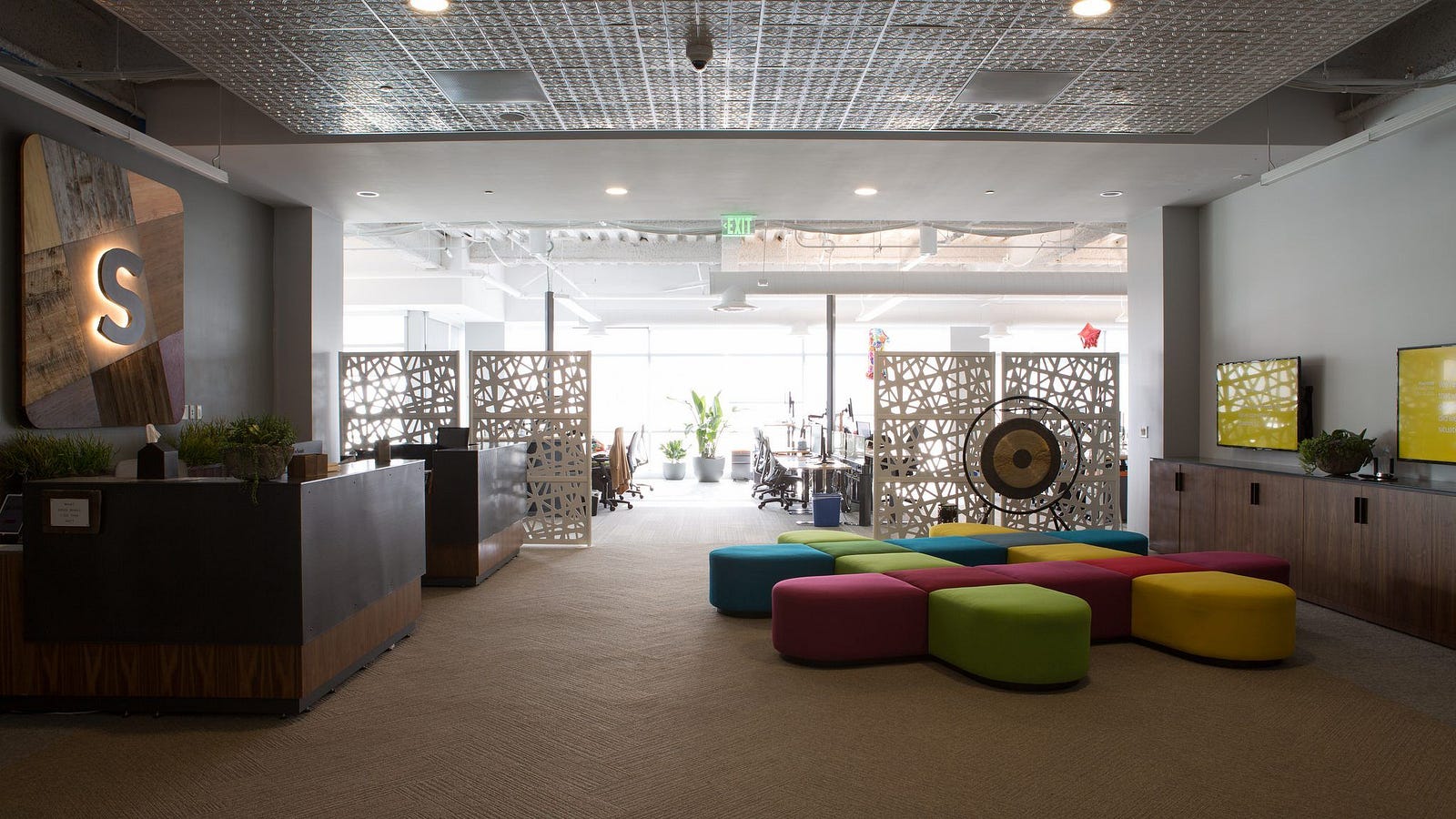
Those looking for an internship in the tech world should seek out Slack’s San Francisco headquarters.
Each intern is guided by a mentor, and can connect with executives and team leaders on a daily basis. Outside of the office responsibilities, Slack offers interns volunteer opportunities and networking as you build your resume. Currently, Slack’s San Francisco headquarters is seeking a Sales Strategy Intern. Ideally, candidates for the position will possess several years of prior management consulting experience, and will receive their MBA in 2020.
Applying for a Slack Career
One of Slack’s greatest assets is its diversity. According to a recent article in The Atlantic, “Slack has been outperforming other Silicon Valley companies, [in diversity of its workforce]. At Google, Facebook, and Microsoft, women hold between 19 percent and 28 percent of leadership positions … At Slack, women make up 31 percent of leaders and hold 34 percent of technical roles. Also … percentages of underrepresented minorities … are, in some cases, triple that of peer companies.”
This alone makes a Slack career appealing, but additional benefits are numerous. The company gives each employee $500 a year toward personal development, and $2000 annually toward professional development. One hundred percenter of health care expenses are covered for employees and their families, and $150 per month reimbursement for fitness/wellness memberships. Slack gives its workers “generous parental and new child bonding leave”.
Massage therapy, catered lunch and breakfast, game nights, and a ‘meeting-light’ culture round out the list of the company’s appealing perks.
Currently, there are close to 200 open positions at Slack both in the U.S. and abroad. Here is a look at just a few.
San Francisco
- Business Intelligence – Marketing and Business Intelligence – Product
- Data Scientists for Lifecycle and Product
- Corporate Development Manager
- Business Development Manager – Platform
- Various Accountancy Positions
New York City
- Business Intelligence Analyst, Product
- Sales Operations, Deal Strategy Lead
Denver
- Senior Systems Analyst
- Sales Operations, Senior Commissions Analyst
In Tokyo, Slack is seeking a Partner Manager, Systems Integrator Alliances along with a Head of Enterprise Marketing. In London, there is an open position for a Senior Analyst Relations Manager, and the Dublin office is in search of Accountant, along with a Customer Experience Specialist.
Slack Career Salaries
According to data gathered by Paysa, Slack’s San Francisco office pays an average of $183,997 per year. This falls within a range of $126,305 to $222,941. A breakdown of the average is as follows: $132,038 base salary; $34,566 in equity; $17,392 annual bonus, and a $9,641 signing bonus. For specific positions more in-line with MBA talent, a senior marketing manager earns an average base salary of $108,000

For a full listing of Slack’s current open positions along with application instructions, visit the careers site.
MBA
Muma College of Business MBA Program Structure
The University of South Florida Muma College of Business MBA program can be taken in either a full-time or part-time structure, and can be completed in as little as 18 months or as long as long as five years. USF’s MBA program offers a variance in schedule flexibility, allowing students to complete the program at the pace of their choosing while also maintaining full-time employment outside of the classroom. With fast track scheduling, students can complete a three-credit program in as little as four-to-twelve weeks, rather than the traditionally required 16 weeks you may find in most other MBA programs. With the structure, students can afford to take on more classes within a smaller window of time.
The AACSB-accredited program offers one-on-one mentorships, case competitions, career fairs, career advancement assistance, and much more. The entire program requires 49 credit hours to complete: 16 credits of business foundation courses; 18 credits of required courses; and 15 credits of elective courses.
Curriculum
Students complete 16 hours of the business foundation courses, 18 hours of required courses, and 15 hours of electives. Individual areas of study emphasis offered in the USF MBA program are as follows:
• Analytics & Business Intelligence
• Compliance, Risk & Anti-Money Laundering
• Creativity and Innovation
• Digital Marketing
• Entrepreneurship
• Finance
• Healthcare Management
• International Business
• Leadership Concepts & Organization Theory
• Management Information Systems
• Marketing Strategy
• Project and Process Management
• Sustainable Business
Part-Time MBA Rankings
• U.S. News & World Report: 97
Tuition, Scholarships, and Financial Aid
For Florida residents, the cost per credit of the USF MBA program is just $467.34. For out-of-state residents, the cost is $913.08. In total, with 49 credits, in-state students pay a tuition rate of $22,899.66 and out-of-state students pay $44,740.92. A $100 non-refundable professional development fee is also required to hold a spot in the program upon acceptance.
A limited amount of scholarships are available to new students. Information on which scholarships are offered can be found here. Part-time assistanceships may also be available to select students to help fund their tuition, although assistanceships are limited to full-time students.
Students may be able to fund their education through federal or private loans, although international students are limited to just private loans, if needed. Select U.S. military veterans may be able to have their education funded through the USF Veterans Service and the 9/11 GI Bill.
Admissions
In order to apply to the USF MBA program at the Muma College of Business, applicants must provide the following:
- A completed graduate application
- Official transcripts
- A current résumé
- Statement of Purpose (one to two pages)
- GMAT/GRE scores (waiver available)
- $30 application fee
- Three reference letters
In order to qualify for the program, USF expects at least five years of prior professional work experience. Strong candidates tend to have a minimum undergraduate GPA of 3.0.
Application deadlines are as follows:
Fall
- Domestic – June 1
- International (Outside the US) – June 1
Spring
- Domestic – October 15
- International (Outside the US) – October 15
MBA Jobs: Business Strategy Manager
In order for businesses to succeed, it needs to have an excellent idea, leaders to sell that idea, and a staff to ensure that the idea can come to fruition. While it’s possible for one person to handle these responsibilities on their own, the lone ranger business model is not sustainable as the company expands.
Enter: the Business Strategy Manager, a role tailor-made for adept planners and creative problem-solvers.

What is a Business Strategy Manager?
Think of the business strategy manager as the glue of the C-suite. CEOs, COOs, CFOs, and other leaders all (theoretically) have excellent ideas for how to lead a company, but it is the business strategy manager’s job to transform raw ideas into a cohesive, realistic plan that drives the company forward, creates a profit, and develops a competitive advantage.
The best business strategy managers know what makes a company either sink or swim, and they use that knowledge to develop and execute their strategy.
Here is a representative sample of business strategy manager responsibilities:
- Strategy definition
- Strategic planning
- Strategic performance management
- Strategic risk management
- Data analysis
- Collaboration
How Much Does It Pay?
Given that business strategy managers work directly with the leaders of a company, the salary is competitive. According to Glassdoor, the average salary is $125,899. Business strategy managers can earn an average of $15,993 in cash compensation, which can go upwards of $40,000.

Getting Started
To start, all candidates should come from the business world. A BA/BS in a business-related field (e.g., finance, economics) is a must. Given the high level of this position, most candidates will not get a second glance if they do not have at least two years of rising strategy experience in a professional business setting, not to mention an MBA.
Since negotiation is at the core of the business strategy manager role, successful business strategy manners must have excellent communication and interpersonal skills. Candidates must be clear communicators and effective presenters. In addition, they must be able to develop relationships with both staff members and stakeholders.
In addition to the people skills, successful candidates will have strong analytical skills. Candidates must be able to translate complex financial data into plain language that can be easily understood by all stakeholders. The expectations placed on business strategy managers require that successful candidates are organized and excellent decision makers. They have to make decisions quickly and soundly. This job is well-suited for those who can keep their cool, no matter what is thrown at them.
Since an MBA degree is required to even be considered for the role, it is worthwhile to consider some schools that have strategy concentrations and can set you up for a future career as a business strategy manager.
University of Florida’s Hough Graduate School of Business
University of Florida’s Hough School of Business offers a flexible curriculum that allows students to start preparing for their careers during their first year of the two-year program. Combined with full tuition scholarships offered to full-time MBA students, Hough is an excellent opportunity for the strategically-minded.
Cornell’s SC Johnson School of Business
At Cornell’s SC Johnson College of Business, students receive a top-notch business education. In their second year, Cornell students can complete a concentration in strategy. This extra knowledge will help Cornell students stand out from the others.
Ohio State University’s Fisher College of Business
Ohio State’s Fisher College of Business is an elite business school that has just completed a curriculum redesign that puts students first. Fisher faculty and staff help students construct their MBA so that strategy is their primary concern, rather than just a concentration they complete during the second year.
School v. School: UVA Darden v. Duke Fuqua
When you have two top MBA programs on your list that seem almost precisely the same at first glance, how do you choose the right program for you? You can’t just close your eyes and point to one, hoping for the best. Instead, you need to narrow down each program to the essentials that matter most to you such as location, rankings, cost, employment, and offerings.
Our School v. School series offers a point-by-point comparison of two highly respected MBA programs on the east coast: UVA Darden School of Business and Duke Fuqua School of Business. Read on to find out how these two schools stack up to each other. Continue reading…
New Consulting Jobs for MBA Grads at Strategy&, IDEO, and More
With summer on the way, you can look forward to more sun and plenty of new MBA jobs. Sunny days are ahead, so take your laptop or tablet outside, fill out a job application at any of these well-known consulting firms, and get ready for not only a season filled with fun, but also new opportunities on the horizon. Continue reading…
Online MBA
Miami Business School Professional Online MBA Program Structure
The Professional Online MBA at the Miami Business School is a 42-credit program that can be completed in as little as 24 months or as long as 28 months. Students take one course at a time, providing a flexible schedule for fully employed candidates, with seven weeks per course and 13 total courses. For those who wish to specialize their Professional Online MBA degree, there are three additional options: an MBA with Corporate Finance focus; an MBA with Financial Decision Making focus; and an MBA with Accounting Practice focus. The Financial Decision Making and Corporate Finance tracks will require 47 total credits instead of the standard 42, with at least one more course each. The Accounting Practice focus requires 51 credits to graduate, with 15 courses. Course sequences vary per track and are subject to change.
Curriculum
Regardless of which track applicants may follow, each version of the program starts and ends with required courses. The major difference being that certain tracks require more coursework in line with the focus. For those enrolled in the standard Professional Online MBA program, the MBA with Corporate Finance focus, or the MBA with Financial Decision Making focus, start with BUS 640: The Fundamentals of Finance, Accounting, & Economics. Those in the Accounting Practice focus will complete much more accounting-centric coursework at the beginning of the program. At the end, however, students in any of the four tracks will complete their education with the required course MGT 658: Strategic Management.
Electives may be available depending on the program track. This can be done during the required Miami residency, or online.
Class Profile
The average age of the current Professional Online MBA cohort is 35-years old. About 57 percent of enrolled students are Florida residents, with 43 percent out-of-state residents. About 71 percent of the class is male, with 29 percent female students. Just about 9 percent of the class are also active military members.
Career Statistics
Miami Online MBA grads reported a $30,000 earning potential increase with a degree. About 53 percent of graduates report a post-graduate salary increase. And employers reported an 84 percent hiring rate for Professional Online MBA graduates.
Tuition, Scholarships, and Financial Aid
The total cost of the 42-credit Miami Business School Professional Online MBA is currently $85,260. This comes to $2,030 per credit hour. This does not include a required $2,200 enrollment fee to hold a spot in the program.
Students can fund their education with federal direct unsubsidized loans, federal direct graduate PLUS loans, and/or private loans. Click here for more tuition and potential scholarship information.
Admissions
In order to apply to the Miami Business School Professional Online MBA program, you submit:
• An online application
• Official transcripts
• GMAT scores from within the last five years (waiver available for select applicants)
• A current résumé
• A one-page personal statement
• Proof of English language proficiency (if needed)
• Two professional letters of recommendation
Application deadlines are as follows:
Fall 2019 – July 8, 2019
Spring 2020 – Nov. 11, 2019
Executive MBA in Health Sector Management & Policy
Miami Business School Executive MBA in Health Sector Management & Policy Program Structure
The 23-month Miami Business School Executive MBA in Health Sector Management & Policy program meets for one three-day weekend each month from 8 a.m. EST to 5 p.m. In total, the program requires 48 credits to complete, with each course counting as three individual credits.
Curriculum
There is no pre-requisite coursework needed to apply for the program, and thus no coursework that is required can be waived. Classes study mostly, “case studies, lectures and group discussions,” according to the school.
Each year in the program is split between four separate terms, making eight terms in total. The first term features a required MBA Math Module class, which is the only class in the program that does not count towards the total credits. Because of the highly-specified education in the program, there is no elective coursework.
Class Profile
Students join the program with an average of 12 years of professional work experience. Between clinical and non-clinical experience, the class is almost split evenly, with 53 percent having clinical experience and 47 percent having non-clinical experience.
Career Statistics
The program boats a 100 percent placement rate for graduates attempting to enter the healthcare industry.
Tuition, Scholarships, and Financial Aid
The total cost for tuition and fees for the Miami Business School Executive MBA in Health Sector Management & Policy is currently $113,630. A non-refundable $2,200 fee is also required to hold a spot in the program upon enrollment.
U.S. students may be able to fund their education with federal financial aid. However, private loan options are available and may be a requirement for international applicants. More scholarships and financial aid information can be found here.
Admissions
To apply to the Miami Business School Executive MBA in Health Sector Management & Policy program, the following must be submitted:
• Official transcripts
• A current résumé and business card
• Three letters of recommendation
• GMAT/GRE scores (if required)
• TOEFL and/or IELTS scores (if required)
In order to be considered to the January 2020 cohort, please contact the school are 305-284-3981 or p.ferreira@miami.edu.
Full-Time MBA
Miami Business School Full-Time MBA Program Structure
The 21-month, 56 credit full-time MBA program at the University of Miami Business School begins every year in August. In the first year, students complete core courses structured around foundational management skills, with the second year built around more elective courses. Hand’s on career coaching is offered through the duration of the program.
Curriculum
The first four terms of the Miami Business School full-time MBA program are dedicated to core courses, such as MBA Career Development and Enrichment, Foundation of Marketing Management, The Financial Environment, and more. Student’s begin elective courses in the second year that can be chosen between eight different concentrations. An international trip is also part of the essential curriculum.
Full-Time MBA Rankings
• Bloomberg: 72
• Forbes: 55
Class Profile
A recent Miami Business School MBA full-time MBA class featured around 60 percent male students and 40 percent female students. Most enrolled students earned an undergraduate degree in business (34 percent), engineering (19 percent), and humanities/social sciences (17 percent).
Tuition, Scholarships, and Financial Aid
The current annual tuition for the University of Miami Business School full-time MBA is $2,170 per credit hour. This total comes to $65,754 per academic year (28 credits). A non-refundable enrollment fee of $2,200 is required to hold a spot in the program.
The business school awards students merit-based scholarships that may be based off of previous work, extracurricular activities, and more. For more scholarships information, head to the school’s official scholarship page. Several external scholarships may also be available.
U.S. students may be able to fund their education with federal financial aid. However, private loan options are available and may be a requirement for international applicants.
Admissions
In order to apply to the Miami Business School full-time MBA program, applicants must submit the following:
• An online application
• Official transcripts
• A résumé
• One letter of recommendation
• GMAT/GRE scores
• TOEFL and/or IELTS scores (if necessary)
Once applications are complete, strong candidates will be invited to conduct an interview with the Miami Business School admissions team.
Application deadlines:
SPRING 2022
| Application Deadline | Decision Release | |
| Round 3 | OCT 15* | NOV 12 |
| Final Round | NOV 15 | DEC 10 |
SUMMER 2022
| Application Deadline | Decision Release | |
| Round 1 | OCT 15 | NOV 19 |
| Round 2 | DEC 1 | JAN 7 |
| Round 3 | JAN 10* | FEB 11 |
| Final Round | MAR 15 | APR 15 |
Fall 2022 |
MBA |
Specialized Masters |
|||||||||||||||||||||||||
|
|
|
Where Should You Go? The Benefits of a Mid-Tier MBA
You have an MBA acceptance letter from both Harvard Business School and Cornell SC Johnson. Which do you choose?
Your gut reaction might be to choose Harvard’s top-ranked MBA program without a second’s pause. After all, aren’t business school rankings—like those compiled by the Financial Times and U.S. News & World Report—the most important consideration when choosing your MBA program?
In some cases, you might be right. If you’re most interested in reputation, then ranking is all important. However, there are many times when rankings should be taken with a grain of salt. They tell a story, but not the whole story, especially when it comes to you as an individual candidate.
Just because a specific school is top-ranked, does not mean it should be the top rank for you. Many mid-level MBA programs are just as impressive and could be a better fit for you depending on your needs.
In this article, we’ll take an in-depth look at when and why you should choose a mid-ranked MBA program over a top-ranked program. Continue reading…
University of Miami Business School
History
The first official iteration of the Miami Business School was founded in 1929 as the University of Miami School of Business Administration. In 1948, the school began offering its first MBA program and earned AACSB-accreditation less than ten years later. In the early 1970s, the school introduced its Executive MBA program, which was followed soon thereafter by the introduction of the Professional MBA and Executive MBA in Health Sector Management and Policy programs.
The School of Business firmly established a central base on the University of Miami campus in 1980 with the opening of the School of Business Administration Complex. In the decades to come, the school introduced a Ph.D. program, the Mentor Program, the FIRST Step Program for Undergraduates, the Miami Executive MBA en Español, and Accelerated MBA in Real Estate program, the Miami Global Executive MBA for the Americas, and several other specialized Master’s program. In 2018, the school was officially renamed as the University of Miami Business School.
School Rankings
• Bloomberg: 62 (U.S.); 74 (Global)
• Forbes: 55
Locations
The Miami Business School rests in the heart of the University of Miami, in the southern section of the city on the edge of the Mahi Waterway. The school is located less then 10 miles south of the Miami International Airport.
Facilities
The School of Business Administration Complex at the Miami Business School houses the George W. Jenkins Building and the William and Elsa Stubblefield Classroom Building. The Stubblefield Classroom Building features classrooms, faculty offices, conference rooms, and other administrative areas, while the Sanford L. Ziff Graduate Career Services Center and the Alma Jennings Foundation/Carlos and Rosa de la Cruz Study Center are housed on the first floor of the Jenkins Building.
Faculty
Faculty at the Miami Business School teach in nine different departments and represent 30 different countries.
Student Body
The most recent Miami Business School MBA full-time MBA class featured around 60 percent male students and 40 percent female students. Most enrolled students earned an undergraduate degree in business (34 percent), engineering (19 percent), and humanities/social sciences (17 percent).
MBA Degree Offerings
The Miami Business School offers a traditional full-time MBA, an accelerated seven month MBA, and a specialized Accelerated MBA in Real Estate, in addition to several different Executive MBAs, a part-time Professional MBA, and an Online MBA. The school also has several dual degree options, including a BArch/MBA, MD/MBA, JD/MBA, JD/LLM/MBA, and a Ph.D./MBA.



